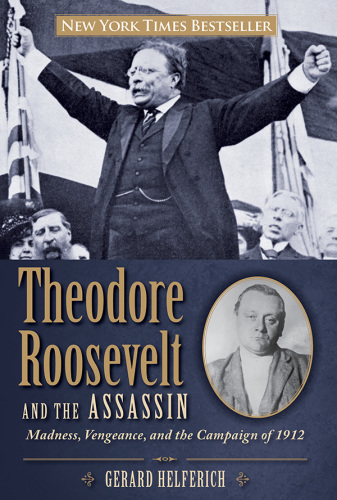
Theodore Roosevelt and the Assassin
Madness, Vengeance, and the Campaign of 1912
- اطلاعات
- نقد و بررسی
- دیدگاه کاربران
نقد و بررسی

September 1, 2013
A lively account of Theodore Roosevelt's would-be murder reveals the roiling issues and personalities of that key campaign. Not many people know the name of John Flammang Schrank (1876-1943), a German-American New Yorker who tracked Roosevelt's stops on the railroad campaign circuit of late summer and early fall of 1912 and resolved to shoot him. The actual shooting on October 14 in Milwaukee was superficial, unlike that 11 years earlier of President William McKinley, assassinating him and thus leaving Roosevelt as president. Yet Roosevelt's shooting certainly yanked American politics into the modern era and revealed the courage of the irrepressible victim. In this light-pedaling, accessible study, Helferich (Stone of Kings: In Search of the Lost Jade of the Maya, 2011, etc.) creates several wonderful character studies: of Roosevelt, whom he calls either the Colonel or "the third termer," to designate the focus of Schrank's rage against him in putting himself up for election to a third (nonconsecutive) term; of the much-maligned incumbent President William Howard Taft, Roosevelt's handpicked successor who was so cowed by the anxiety of influence that he could not exert his own will in his own term and, when the wildly popular Roosevelt resolved to challenge him for the Republican nomination, fell out with him in an ugly, public battle; and of Schrank, a friendless landlord with accumulated grievances who believed Roosevelt's hubris and unchecked ambition to run for a third term was a gross abuse of tried-and-true democratic institutions. Moreover, Helferich examines a dream that Schrank supposedly had that convinced him of Roosevelt's conniving in McKinley's murder and lent some truth to the court's assumption that Schrank was delusional. Outsized personalities within a blistering campaign render this work a rollicking history lesson.
COPYRIGHT(2013) Kirkus Reviews, ALL RIGHTS RESERVED.

December 1, 2013
The 1912 presidential campaign had four party candidates--Teddy Roosevelt (Progressive), Woodrow Wilson (Democratic), Eugene V. Debs (Socialist), and President William Howard Taft (Republican). Consulting police reports and newspaper articles, Helferich (Humbolt's Cosmos) shows how John Schrank (termed the "assailant," contrary to the title) stalked Roosevelt across several states before making an attempt on his life in Milwaukee on October 14. Crosscutting between the two men's travels, Helferich gives nearly equal attention to Roosevelt and to the naturalized American who thought he was divinely appointed to avenge President McKinley's 1901 assassination and save his adopted country from the tyranny of another presidential term for Roosevelt, who'd become president after McKinley's death. The attempt put the campaign on hold for a couple of weeks, but Helferich states that it probably had no effect on the election results (or on Roosevelt's health). VERDICT There are books on the assassination attempts on FDR, Harry Truman, Gerald Ford, and Ronald Reagan, but this is the first modern investigation of the assault on Teddy Roosevelt, albeit not when he was president. Helferich writes with the general reader in mind. Those intrigued by Candice Millard's Destiny of the Republic: A Tale of Madness, Medicine, and the Murder of a President, on the Garfield assassination, or Scott Miller's The President and the Assassin: McKinley, Terror, and Empire at the Dawn of the American Century, on the McKinley assassination, may well wish to read this work.--Frederick J. Augustyn Jr., Lib. of Congress, Washington, DC
Copyright 2013 Library Journal, LLC Used with permission.




دیدگاه کاربران